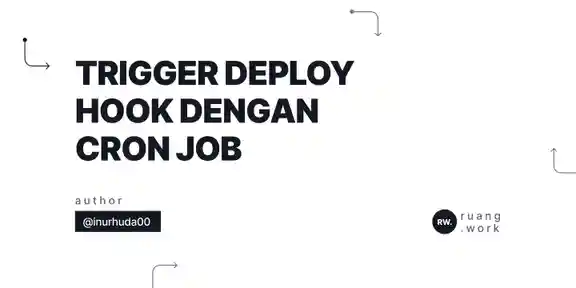Create a Cronjob in Next.js to Trigger Deploy Hook
8 min read

Cronjob is a feature in operating systems or cloud services that allows us to run a task at a specified time on a scheduled basis.
In this article, we will discuss how to create a cronjob in Next.js to run a trigger deploy hook task.
go to What is Deploy Hook? sectionWhat is Deploy Hook?
Deploy Hook is a URL that we can use to trigger the process of deploying applications on cloud services such as Vercel, Heroku, or Netlify. By using the Deploy Hook, we can ensure that every time we push to the main branch of the Git repository, our application will be deployed automatically.
However, sometimes we want to deploy manually, for example if we have made changes to the application configuration or want to deploy to a different environment. In such cases, we can use a cronjob to trigger the Deploy Hook and start the deploy process manually.
go to Setting up Environment Variable sectionSetting up Environment Variable
You can create DEPLOY_HOOK_URL by following vercel’s tutorial here.
Before we start creating a cronjob on Next.js, we need to set up an environment variable to store the Deploy Hook URL. Here are the steps to set up the environment variable:
- Open the
.env.localfile in our Next.js project. - Add the following line to the file:
DEPLOY_HOOK_URL=https://api.vercel.com/v1/integrations/deploy/prj***Ensure that the DEPLOY_HOOK_URL value is populated with the correct Deploy Hook URL.
Create API to Trigger Deploy Hook
After the environment variables have been set up, next we will create an API to trigger the Deploy Hook in Vercel. Here is an example API implementation for Next.js using TypeScript that handles errors and some other possibilities:
import { NextApiHandler } from 'next'import axios from 'axios'
const deployHookUrl = process.env.DEPLOY_HOOK_URL
const handler: NextApiHandler = async (req, res) => { try { if (!deployHookUrl) { throw new Error('Deploy hook url is not set.') }
const response = await axios.post(deployHookUrl)
if (response.status === 200) { res.status(200).json({ message: 'Deployment started.' }) } else { throw new Error('Failed to trigger deployment.') } } catch (error) { console.error(error)
let errorMessage = 'Server error.'
if (error.response && error.response.data) { errorMessage = error.response.data.message } else if (error.message) { errorMessage = error.message }
res.status(500).json({ message: errorMessage }) }}
export default handlerIn the example above, we use process.env.DEPLOY_HOOK_URL to retrieve the Deploy Hook URL that has been stored in the DEPLOY_HOOK_URL environment variable. Then, we ensure that the environment variable value is not empty or null before making a POST request to the Vercel Deploy Hook. If the value of the DEPLOY_HOOK_URL environment variable is empty or null, we will throw an error with the message “Deploy hook url is not set.”.
In this case, it is important to ensure that the value of the DEPLOY_HOOK_URL environment variable is set and matches the Deploy Hook URL we want to use.
Configure Vercel Cron Jobs
Next, after creating the API to trigger the Deploy Hook in Vercel, we need to set up a cron job so that the API can be run on a scheduled basis. Here is an example of a cron configuration from Vercel that can be set in the vercel.json file:
{ "crons": [ { "path": "/api/cron", "schedule": "0 0 1-31/2 * *" } ]}In the example above, we created a cron job that will run the API on the /api/cron path every odd date (1, 3, 5, … 31) at 00:00. We can change the configuration of this cron job as needed.
base on vercel cronjob article. here some config.
# ┌───────────── minute (0 - 59)# │ ┌───────────── hour (0 - 23)# │ │ ┌───────────── day of the month (1 - 31)# │ │ │ ┌───────────── month (1 - 12)# │ │ │ │ ┌───────────── day of the week (0 - 6) (0 is Sunday, 6 is Saturday)# │ │ │ │ │# │ │ │ │ │# │ │ │ │ │# * * * * *| expressions | Description |
|---|---|
* * * * * | Triggers every minute |
*/10 * * * * | Triggers every ten minutes |
0 * * * * | Triggers at the beginning of every hour |
0 3 * * * | Triggers every day at 3:00 am |
10 5 * * 0 | Triggers every Sunday at 5:10 am |
By using a cron job and API to trigger the Deploy Hook in Vercel, we can make the application deployment process easier and more scheduled.
In addition, by utilizing these features, we can focus more on developing our applications and avoid monotonous and time-consuming manual processes.